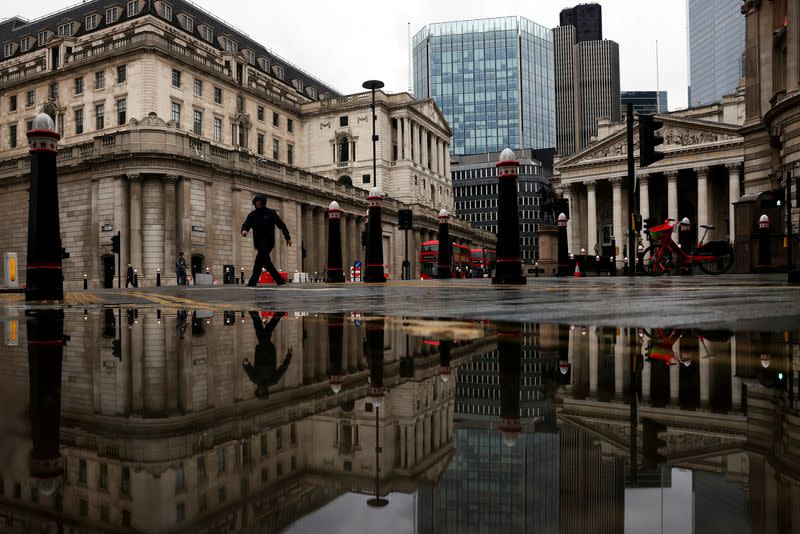Bank of England to mull its message on rates after bond market rout

By William Schomberg
LONDON (Reuters) - The Bank of England must decide next week whether to tell investors that they are betting too heavily on future interest rate hikes as Britain races ahead with COVID-19 vaccinations and the government pumps yet more cash into the economy.
In early 2020, financial markets were weighing up whether the BoE would cut rates below zero as the country reeled from its biggest economic collapse in three centuries last year.
But that was before a turnaround in expectations for global growth and inflation, triggered by U.S. President Joe Biden's $1.9 trillion stimulus plan.
Britain's recovery hopes were further boosted by finance minister Rishi Sunak's announcement on March 3 of 65 billion pounds ($90 billion) in extra stimulus.
Investors now expect the BoE's Bank Rate to rise to about 0.7% in three years' time, up from its current all-time low of 0.1% although still way below its historic average.
Sterling has risen about 2% since the central bank's last meeting on Feb. 4, and British government bonds recorded one of their biggest monthly sell-offs in over a decade in February.
"This constitutes a material tightening in financial conditions," HSBC economists Elizabeth Martins and Simon Wells said in a note to clients. "The question for the BoE in March is whether this is warranted by growth and inflation expectations – and if not, then how and when it should act."
Words of warning alone might not be enough from the BoE next Thursday, the HSBC economists said.
On March 4, Federal Reserve Chair Jerome Powell said a rise in market interest rates was "notable and caught my attention", only for yields on U.S. Treasuries to rise further.
BOND-BUYING
The BoE's main policy tool, for now at least, is its 895 billion-pound bond-buying scheme which is due to be fully used up later this year, unless there is a further increase in its size or its pace is slowed down.
Analysts think the BoE will not change its stimulus programme on March 18 but it might send a signal that an increase to its bond-buying firepower is an option for May when it will announce new economic forecasts.
That would show that the BoE remains hesitant about counting too much on the recovery.
Governor Andrew Bailey said on Monday he was only cautiously optimistic due to the uncertainty about the pandemic's impact on the economy and the risk of job losses when Sunak's jobs protection measures finally end.
The BoE will also be checking that its assumption of a relatively small drag from Brexit - which fully kicked in on Jan. 1 - is borne out by the data.
Some other MPC members are more worried than Bailey about a weak recovery which could yet justify negative rates from later this year, once banks have had time to prepare.
Only BoE Chief Economist Andy Haldane has sounded the alarm about an inflation "tiger".
Britain's inflation rate is expected to hit the BoE's 2% target in the coming months, but much of the rise will reflect last year's pandemic hit and one-off changes to energy prices.
Bailey said this week that the BoE's task was to get inflation back up to 2% and hold it there.
($1 = 0.7208 pounds)
(Writing by William Schomberg; Editing by Catherine Evans)

 Yahoo Finance
Yahoo Finance 